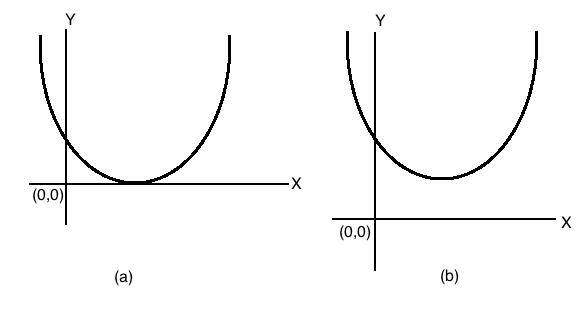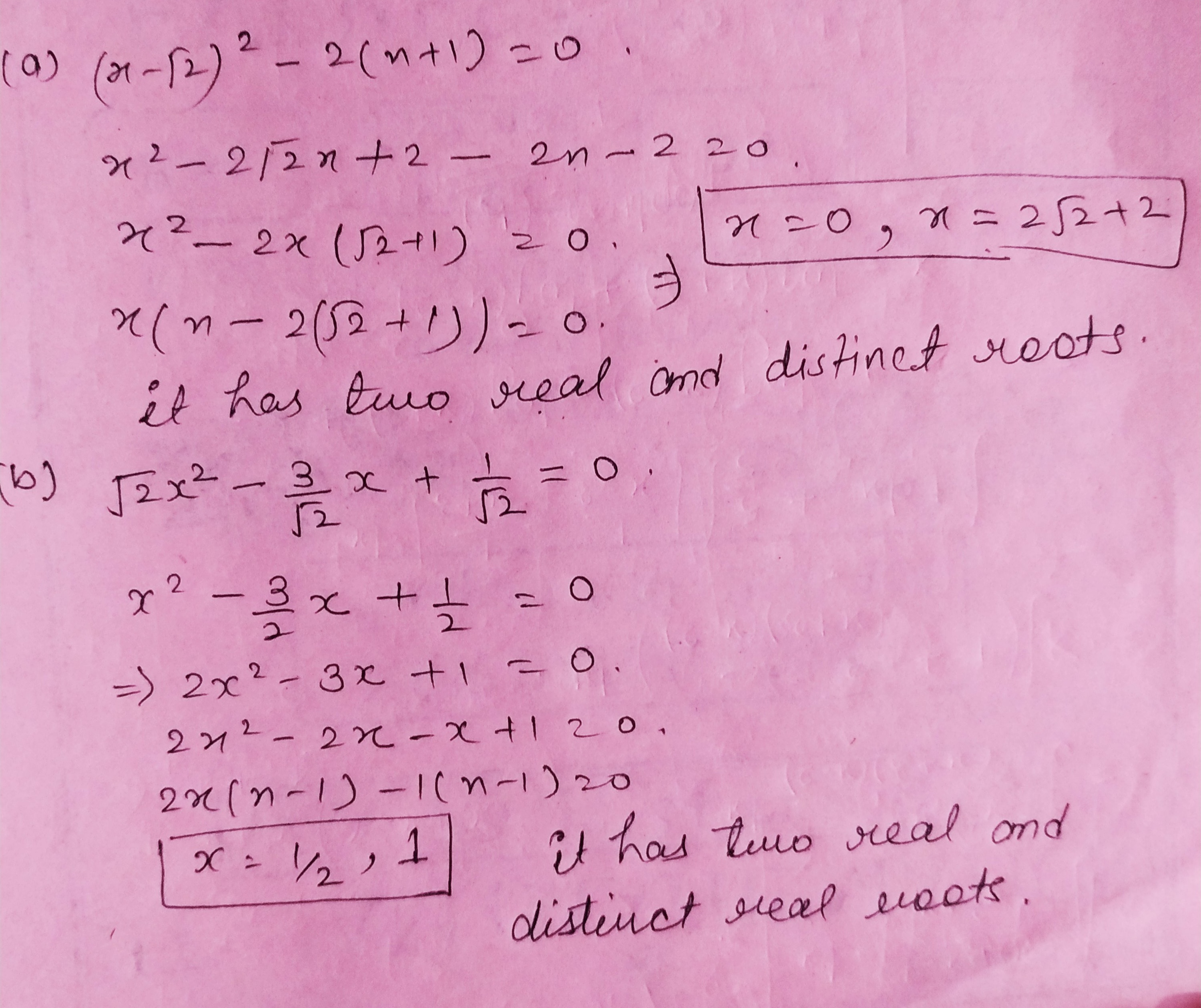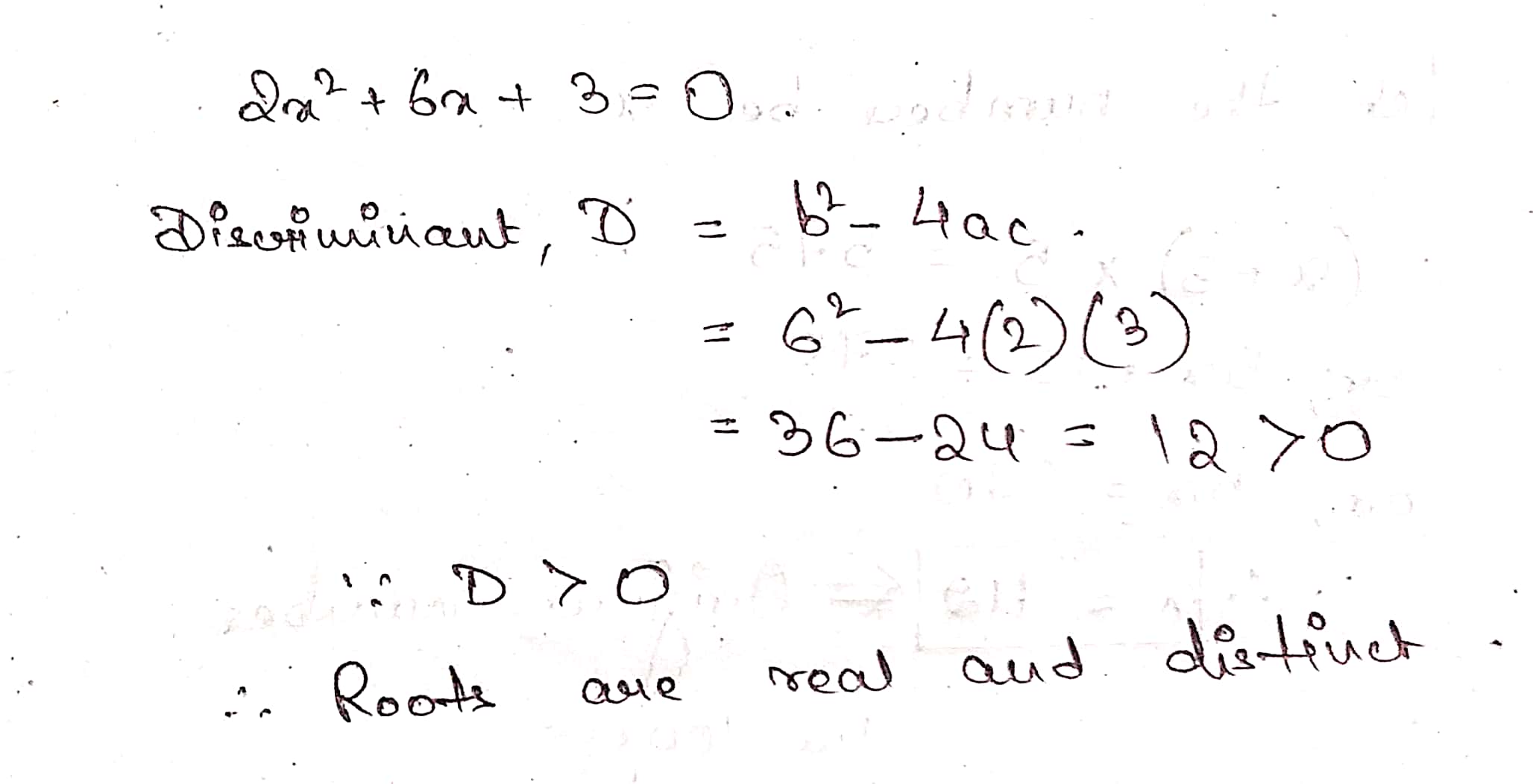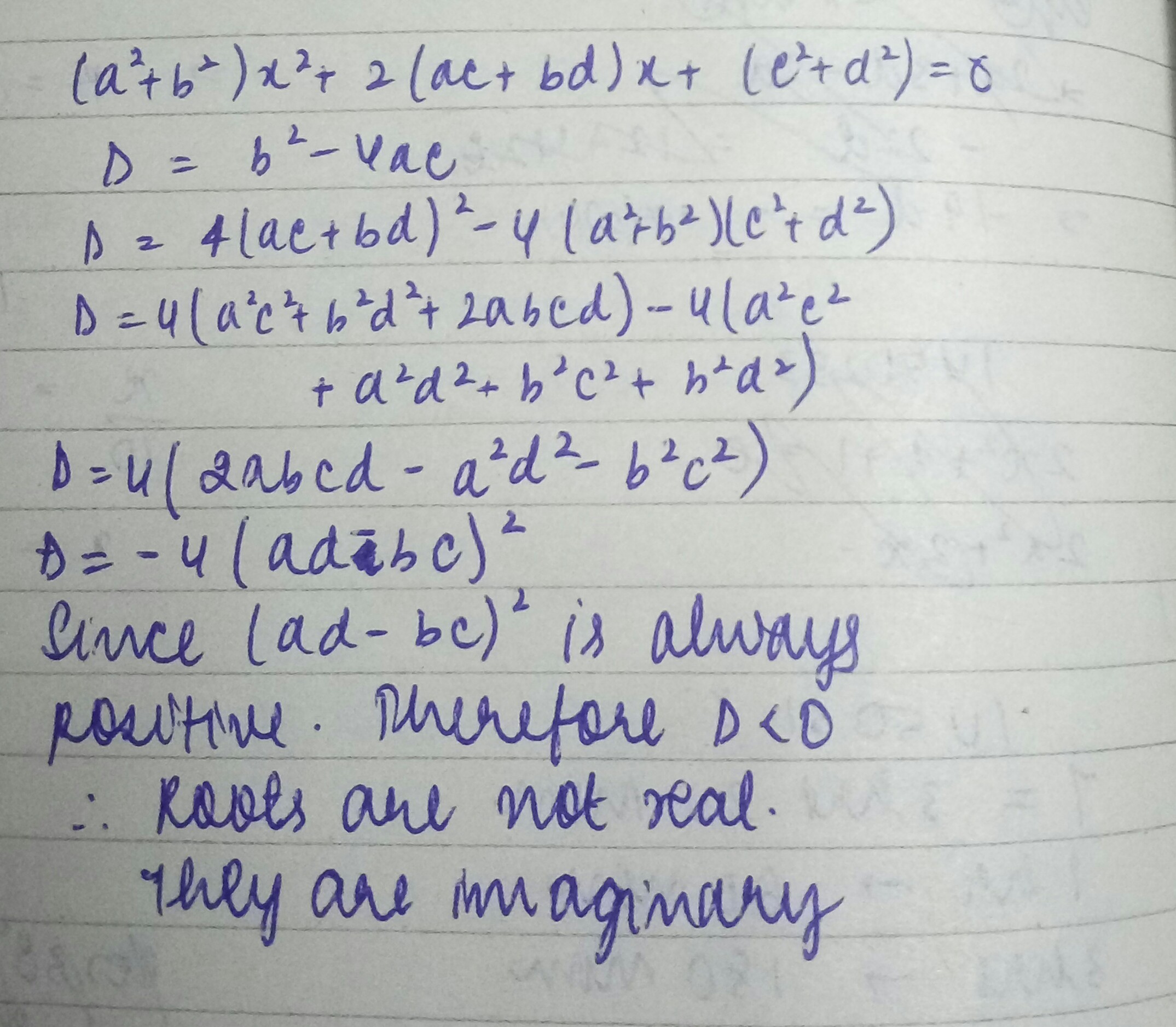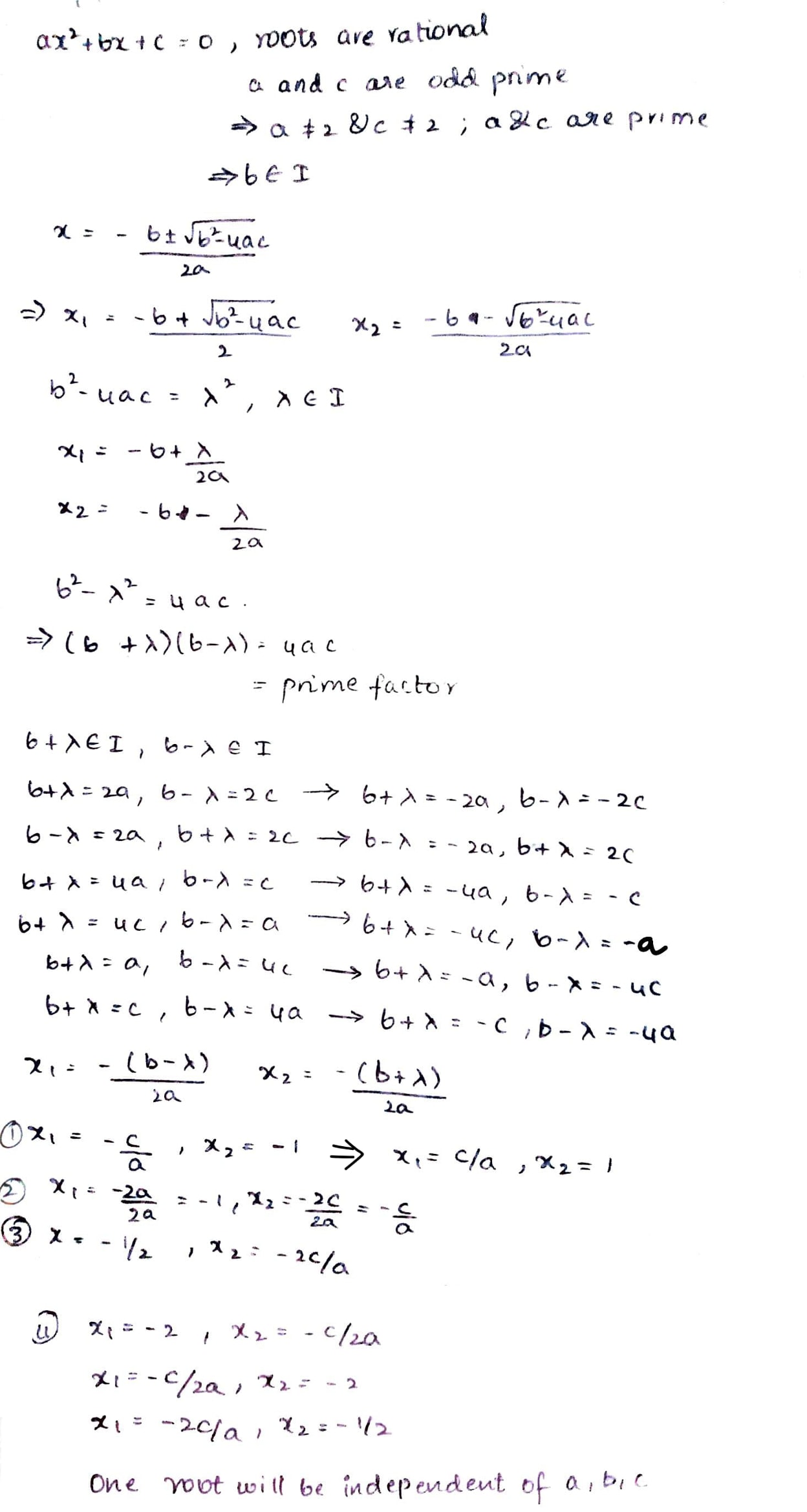Complex Numbers And Quadratic Equations - Class 11 Commerce Maths - Extra Questions
If the roots of the equations $$ax^{2}+2bx+c=0$$ and $$bx^{2}-2\sqrt{ac}x+b=0$$ are simultaneously real, then prove that $$b^{2}=ac$$.
Determine the nature of the roots of the equation $$4x^2 - 4x + 1 = 0$$
Find the nature of the roots of the following:
$${x}^{2}+x+1=0$$
If $$b^2 - 4ac \geq 0$$, then write the nature of roots of a quadratic equation $$ax^2 + bx + c = 0$$.
Find the no. of solutions of $${x}^{2}+2x+2=0$$.
For what positive values of 'm', roots of the equation $$x^2 + mx + 4 = 0$$ are equal
What is the nature of the roots of the quadratic equation $$a{ x }^{ 2 }+bx+c=0$$ if
(a) $${ b }^{ 2 }-4ac=0$$
(b) $${ b }^{ 2 }-4ac<0$$
In the given, determine whether the given quadratic equation has real roots and if so, find the roots.
$$25{ x }^{ 2 }+20x+7=0$$
Determine the nature of the roots of the given quadratic equation
$$2{ x }^{ 2 }+5x+5=0\quad $$
Determine the nature of the roots of the given quadratic equation
$${ x }^{ 2 }-4x+4=0$$
Determine the nature of the roots of the follwoing quadratic equation :$$2x^2-6x+3=0$$
Determine the nature of roots of the given quadratic equation $$3x^{2} + 2\sqrt {5}x - 5 = 0$$.
$$x^{2}+1$$ has no zeros. Why?
Find $$a$$ so that roots of $$x ^ { 2 } + 2 ( 3 a + 5 ) x + 2 \left( 9 a ^ { 2 } + 25 \right) = 0$$ are real.
Find the values of $$m$$ for which the quadratic equation $${x}^{2}-m(2x-8)-15=0$$ has (i) equal roots; (ii) both roots positive
Find the discriminant of the following quadratic equations and discuss the nature of the roots .
$$6 x ^ { 2 } - 13 x + 6 = 0$$
2.$$\sqrt { 6 } x ^ { 2 } - 5 x + \sqrt { 6 } = 0$$
3.$$24 x ^ { 2 } - 17 x + 3 = 0$$
4.$$x ^ { 2 } + 2 x + 4 = 0$$
5.$$x ^ { 2 } + x + 1 = 0$$
6.$$x ^ { 2 } - 3 \sqrt { 3 } x - 30 = 0$$
Without solving, comment upon the nature of roots of each of the following equations:
$$ 6 x^{2}-13 x+4=0 $$
Without solving, comment upon the nature of roots of each of the following equations:
$$ 2 x^{2}+8 x+9=0 $$
Without solving, comment upon the nature of roots of each of the following equations:
$$ 25 x^{2}-10 x+1=0 $$
Without solving, comment upon the nature of roots of each of the following equations:
$$ 7 x^{2}-9 x+2=0 $$
If the equation $$(1+m^{2})x^{2}+2mcx+(c^{2}-a^{2})=0$$ has equal roots, then prove that $$c^{2}=a^{2}(1+m^{2})$$.
Show that the equation $$2(a^{2}+b^{2})x^{2}+2(a+b)x+1=0$$ has no real roots, when $$a\neq b$$
Prove that both the roots of the equation $$(x-a)(x-b)+(x-b)(x-c)+(x-c)(x-a)=0$$ are real but they are equal only when $$a=b=c$$.
Discuss the nature of roots of the given equation $$y^2 - 7y + 2 = 0$$
Determine the nature of the roots of the equation $$2x^2 - 5x - 1 = 0$$
Prove that the roots of the equation $$(a-b+c)x^2+2(a-b)x+(a-b-c)=0$$ are rational numbers for all real numbers a and b and for all rational c.
Determine the nature of the roots of the given quadratic equation
$${ x }^{ 2 }+x+1=0$$
In the given, determine whether the given quadratic equation has real roots and if so, find the roots.
$$9{ x }^{ 2 }+7x-2=0$$
Number of real roots of $${x} + \sqrt{1- x^2}={5}$$
State whether the following quadratic equation have too distinct equal roots:
a) $$( x - \sqrt { 2 } ) ^ { 2 } - 2 ( x + 1 ) = 0 \quad { b) } \sqrt { 2 } x ^ { 2 } - \frac { 3 } { \sqrt { 2 } } x + \frac { 1 } { \sqrt { 2 } } = 0$$
Find the nature of the roots of the following quadratic equations . If the real roots exit. find them:1) $$2{x^2} - 3x + 5 = 0$$2) $$3{x^2} - \root 4 \of 3 x + 4 = 0$$
Determine the set of values of $$k$$ for which the given quadratic equation has real roots:
$$2x^{2}+kx-4=0$$
Show that the equation $$x^{2}+ax+1=0$$ has real and distinct roots for all real values of $$a$$.
Write the nature of the roots of the folliowing quadratic equations
$$\quad { 2x }^{ 2 }+6x+3=0$$
How many roots of the following quadratic equations are real: $$4x^{2}-4a^{2}x+(a^{4}-b^{4})=0$$
For what value/values of $$k$$:
$$(k+1)x^{2}-2(3k+1)x+8k+1=0$$ has equal roots
Find the value of k for which the Q.E $$kx^2+1-2(k-1)x+x^2=0$$ has equal roots.
Cheek whether the quadratic equation $$\left( { a }^{ 2 }+{ b }^{ 2 } \right) { x }^{ 2 }+2\left( ac+bd \right) x+{ c }^{ 2 }+{ d }^{ 2 }=0$$ has real roots.
Find the nature of the roots of the following quadratic equation:1.$$3{x^2} + 7x + 2 = 0$$2.$${\left( {x + 3} \right)^2} + 4x + 7 = 0$$3.$$2{x^2} - 8x + 34 = 0$$4.$${x^2} + 2\sqrt {3x} - 1 = 0$$
Without solving, comment upon the nature of roots of each of the following equations:
$$ x^{2}-a x-b^{2}=0 $$
Without solving, comment upon the nature of roots of each of the following equations:
$$ x^{2}+2 \sqrt{3} x-9=0 $$
Find the nature of roots of following quadratic equations.
$$2x^2+x-1=0$$
Write nature of roots by general form of discriminant of equation $$ax^2+bx+c=0$$.
Find the value of $$k$$, for which following quadratic equations have real and equal roots
$$2x^2+kx+3=0$$
Find the value of $$k$$, for which following quadratic equations have real and equal roots
$$x^2-2(k+1)x+k^2=0$$
For quadratic equation $$ax^2+bx+c=0, a\neq 0$$, at which nature of roots depends?
Describe nature of roots of quadratic equation $$ax^2 +bx+c=0, a\neq 0$$
Without solving the following quadratic equation, find the greater value of $$p$$ for which the given equation has real and equal roots. $$x^2+(p-3)x+p=0$$.
Prove that the roots of the equation $$bx^{2} + (b - c) x + b(b - c - a) = 0$$ are real if those of $$ax^{2} + 2bx + b = 0$$ are imaginary and vice versa.
If $$ a $$ and $$ c $$ are odd prime numbers and $$ a x^{2}+b x+c=0 $$ has rational roots where $$ b \in I . $$ Prove that one root of the equation will be independent of $$ a, b, c $$
Class 11 Commerce Maths Extra Questions
- Binomial Theorem Extra Questions
- Complex Numbers And Quadratic Equations Extra Questions
- Conic Sections Extra Questions
- Limits And Derivatives Extra Questions
- Permutations And Combinations Extra Questions
- Probability Extra Questions
- Relations And Functions Extra Questions
- Sequences And Series Extra Questions
- Sets Extra Questions
- Straight Lines Extra Questions
- Trigonometric Functions Extra Questions
